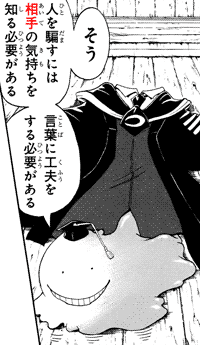Not to be confused with a, itee あ、いてぇ, from a, itai あ、痛い, "ah, it's painful," "ah, it hurts!"
Manga: Haikyuu!! ハイキュー!! (Chapter 67)
Usage
Literally, aite 相手 translates to the "other party" of a given action. This can be your "partner," "adversary," "opponent," and so on, but often it doesn't translate to anything at all.It works in the same sense as kocchi, socchi, acchi, or kochira, sochira, achira, can mean "my party," "your party," "that party."
However, aite is different because sochira is usually the "party of the listener," whom you're talking to. The aite of an action isn't necessarily the listener, it can be a third person.
Examples
The easiest way to understand this is to see some examples.目の前の相手
Manga: Haikyuu!! ハイキュー!! (Chapter 67)
- {me no mae no aite sae
mietenai} yatsu ga
{sono saki ni iru} aite wo
taoseru mon ka yo
目の前の相手さえ見えてない奴が
その先に居る相手を倒せるもんかよ
A guy [that] {can't even see the aite in front of [his] eyes}
able to defeat the aite [that] {is after that} will?- Here, aite 相手 is the adversary in a volleyball game.
- If you can't even concentrate on your current adversary, how can you defeat the next one?
相手の気持
Manga: Assassination Classroom, Ansatsu Kyoushitsu 暗殺教室 (Chapter 7)
- Context: Koro-sensei teaches how to deceive people.
- sou そう
[That's right.] - hito wo damasu niwa
{aite no kimochi wo
shiru} hitsuyou ga aru
人を騙すには相手の気持ちを知る必要がある
In order to deceive a person, there's a necessity {to understand the aite's feelings}.- Here, aite 相手 is whom you're deceiving.
- In order to deceive them, you need to know how they think.
- {kotoba ni kufuu wo suru} hitsuyou ga aru
言葉に工夫をする必要がある
There's a necessity {to [think carefully about your] words}.- You can't just speak carelessly, you need to be scheming.
相手にしてくれない
Manga: Doraemon ドラエもん (Chapter 7, Peko-Peko Batta ペコペコバッタ)
- dare mo aite ni shite kurenai yo, waa~~.
だれも相手にしてくれないよ、ワァ~~。
Nobody makes [me] their aite, wahhh~~.- This kind of phrase is used when someone ignores another person, in the sense they won't do an activity with them as their aite, they won't talk with them, for example.
まとめて相手してやる
Manga: Gabriel DropOut, Gavuriiru Doroppuauto ガヴリールドロップアウト (Chapter 8)
- Context: classic one-vs-all fight line.
- yoshi joutou da omaeraa!!
よし上等だお前らぁ!!
Alright, bring it on [you] guys!!- joutou da 上等だ
[That's] high-grade. (literally.)
That's perfect. (sarcastically.)
Bring it on! (often.)
- joutou da 上等だ
- matomete aite shite-yaru kara kakatte-koi!!
まとめて相手してやるからかかってこい!!
[I'll] make [you] all-at-once the aite, so come on!!- Here, she says she'll take on all of them at once. They'll all be her aite in a fight.
- matomeru まとめる
To collect. To put together. To aggregate. (in the sense of turning multiple units into one large collection.) - koi 来い
Come. (imperative of kuru 来る, "to come.")
相手の石
Manga: Hikaru no Go ヒカルの碁 (Volume 2)
- aite no ishi wo kakomeba toreru.
相手の石を囲めば取れる。
If you surround [your] opponent's stones [you] can take [them].- A basic rule of Go 碁.
相手がいない
Manga: Aho Girl アホガール (Chapter 1)
- Context: you can't depend on winning the lottery to survive.
- ja oyomesan ni naru!
じゃ お嫁さんになる!
Then, [I'll] become a bride! - .........aite ga inee daro...
・・・・・・・・・相手がいねーだろ・・・
.........there's no aite, is there...- You don't have an aite.
- You don't have whom to marry with.
- There's nobody that will marry with you.
- inee いねー
Relaxed pronunciation of inai いない, negative form of iru いる.
相手は男なのに
Manga: Baka to Test to Shoukanjuu バカとテストと召喚獣
- Context: Akihisa sees Hideyoshi changing clothes.
- na' nandarou
kono mune no tokimeki wa...
なっ なんだろう
この胸のときめきは…
W-what is it
this throbbing in my chest... - aite wa otoko nanoni
me ga hanasenai...!!
相手は男なのに
目が離せない
Even though the aite is a guy
[I] can't take [my] eyes off [him].- Here, aite refers to whom Akihisa is looking at, in other words, the aite is Hideyoshi, who is believed to be a guy.
- yokatta...
よかった…
[That's a relief...] - tokimeiteiru nowa
boku dake janakatta
ときめているのは
僕だけじゃなかった
[It] was not just me [whose chest was] throbbing. - yoshi kigae-owatta zoi
よし着替え終ったぞい
Okay, I finished changing [clothes].
相手はとんでもない
Manga: MONSTER (Chapter 12)
- ki wo tsukero!!
気をつけろ!!
[Take care]!! - {sakki itta} you ni,
aite wa tondemonee
yarou da!!
さっき言ったように、相手はとんでもねぇ野郎だ!!
Like {[I] said a moment ago}, the aite is a [crazy] bastard!!- The guy you're going after is nuts, Doctor Tenma.
- ton demo nai とんでもない
Without even logic. Unreasonable. Unthinkable. Outrageous.
いくら相手が
Manga: Historie, Hisutorie ヒストリエ (Chapter 8)
- chotto antara
ちょっとあんたら
Wait, [you guys].- anta あんた
anata あなた
You. - ra 等
Pluralizing suffix.
- anta あんた
- ikura aite ga dorei demo
chito hido-sugiru-n-janai ka ne
いくら相手が奴隷でも ちとひどすぎるんじゃないかね
Even given that the aite is a slave, isn't that too cruel, [you] think?- Here, two slave-owners whip a slave in the middle of the city. A third person is bothered by the treatment and thinks they're being too cruel even considering that the one they're whipping is a slave.
- hottoite-moraimashou ka, ima, choukyou-chuu nansu
ほっといてもらいましょうか 今 調教中なんす
Can [I] have [you] leave [us] alone. Now, [we're] in the middle of training [the slave].- nansu なんす
nandesu なんです
na no desu なのです
(used when explaining a situation.)
- nansu なんす
相手は車よ
Manga: Hayate no Gotoku! (Chapter 2)
- Context: villains kidnapped a girl and ran away in a car.
- jitensha... chotto o-kari-shimasu yo.
自転車・・・ちょっとお借りしますよ。
The bicycle... [I'll] borrow [it] for a while.- o__shimasu お〇〇します
(a polite speech pattern.)
- o__shimasu お〇〇します
- ato keisatsu ni renraku wo...
あと警察に連絡を・・・
Also, to the police the contact...- renraku wo tanomu
連絡を頼む
[I] entrust [you] the contact. (the act of contacting.) - He's asking her to contact the police for him.
- renraku wo tanomu
- e? cho... kimi!?
え?ちょ・・・君!?
Eh? Wai... you!?- chotto ちょっと
For a little. For a while.
Wait a little. Wait.
- chotto ちょっと
- go-shinpai-naku.
ご心配なく。
[Don't worry]. - boku ga karanazu oi-tsuite,
ano ko wo tasukete-misemasu.
僕が必ず追いついて、
あの子を助けてみせます。
I'll without-fail catch-up-with-[them] and,
save that [girl].- miseru 見せる
To show [a thing]. (verb.)
To show [an act to someone]. (auxiliary verb.) - He'll show her that he'll save the girl.
- miseru 見せる
- de... demo,
aite wa kuruma yo!!!
で・・・でも、相手は車よ!!!
But... but, the aite is a car!!! - sonna jitensha nanka ja...
zettai oi-tsukeru wake ga—
そんな自転車なんかじゃ・・・
絶対追いつけるわけがー
With just a bicycle like that,
[there's] absolutely [no] way [you'll] catch-up-with-[them].- wake ga nai 訳がない
There's no way [something is true, can happen].
- wake ga nai 訳がない
- The aite of the action "to catch up with" is a car. A car is much faster than a bicycle, so catching up with a car using just a bicycle seems unreasonable for her.










No comments: